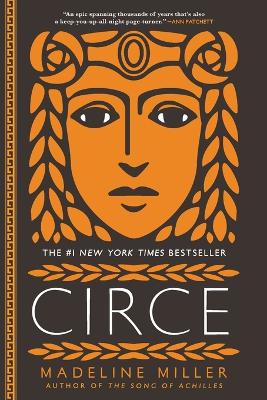Circe is first and foremost a book about a woman. A very human woman with very human failings who, despite being a goddess, was completely and utterly relatable. She is neither good nor evil, just horribly flawed (and aren’t we all?). There are moments in Circe’s life that every reader will find familiar. Her powers gave her the ability to react to situations in ways that I could only dream. All her actions have consequences. Some she feels remorse over, others she doesn’t. She is a woman trying to find her way in a world in which she has no place. Honestly, Circe was everything. She speaks with the voice of all women, at the same time highlighting how voiceless we have been in so much fiction and mythology across the ages. She acts with the righteous anger I know we have all felt, and is irritated by and betrays other women, just as I know we all do. But what struck me most is how she dealt with the removal of her agency and made it her own. She rose above, creating her own truth. Despite the men in her life exerting control, she was, ultimately, the mistress of her own fate, for good or ill.
Humbling women seems to me a chief pastime of poets. As if there can be no story unless we crawl and weep.
Circe covered quite a lot of time (goddesses aren’t precisely short-lived), and I was impressed by how Miller wrote the passage of time perfectly. The pacing is spot on, dwelling on certain snapshots of Greek mythology, but only in how the pertained to Circe herself. Empires rose and fell, gods battled, and heroes perished in the background of this novel. The reader only experiences it through Circe, and for the most part, she wasn’t particularly bothered by it. This wasn’t an epic tale of battle and adventure. It was a human story about one woman and how she experienced the myths that surrounded her.
Miller’s writing is flowing and beautiful. It’s emotive, fluid, but somehow devoid of any excess. Every word has meaning and is carefully chosen to convey a mood. It was breathtaking. This novel is her canvas, and Madeline Miller is a painter, intricately depicting the details of the mythology that she weaves with care and devotion. Despite the mystical, fantastical setting, replete with sea monsters and transfiguration, every word rings true. The world she spins feels real and tangible, a place where anything is possible. Magic didn’t glitter, it was hard labour. Heroes weren’t perfect, each was flawed. Nothing was a stereotype. Everything had depth, and the whole novel resolved with possibility, not with finality.
Only that: we are here. This is what it means to swim in the tide, to walk the earth and feel it touch your feet. This is what it means to be alive.
My one criticism of Circe would be that it did require more than a working knowledge of Greek mythology. Because the novel had to cover so much time and so many characters, it will be difficult to engage with if you aren’t already familiar with a lot of them. The only character development for secondary characters was through Circe’s experience. We just got her perception and understanding of them at the moment in which she met or thought of them. This isn’t necessarily a bad thing, but one I can see being troublesome for some readers less versed, or with little interest in the subject matter.
All in all, Circe was one of the most astounding novels I’ve ever read. I wish I could go back and start it at a time when I could just sit down and read, enjoying the experience in a single sitting. It was a world that immersed me when I could commit to long stretches of reading, and it was a shame that my time with Circe was so scattered. This book is a must. It’s a beautiful, enjoyable, and dare I say important novel.
